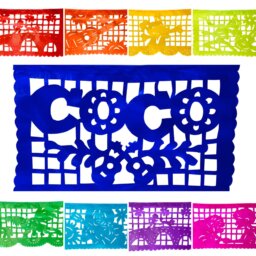
OK, hopefully you read about the first batch of bad asses Méxicana Chingonas in my last post. In case not, we will start with the definition of CHINGONA…
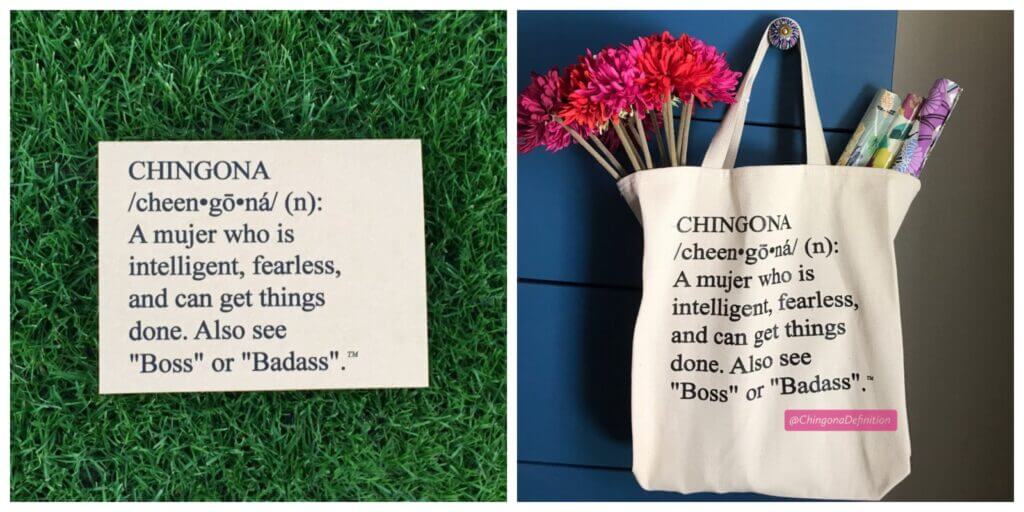
NONE of the following chingona cabronas are Frida Kahlo…although Frida and lesbianism was/will be a common theme in this post You will see a little of Frida, but a lot more of her lifelong love, Diego Rivera weaving his way in and out of stories of these magnificent ladies’ lives. First and most closely being the life of our first Grand Dame…
Dolores Olmedo
María de los Dolores Olmedo y Patiño Suárez (yes, that’s her full name 1908-2002) known as Doña Lola- I have a girl crush on this Girl Boss Broad. And yes, I can call her that because when a broad recognizes the broadiness in the soul of another, it must be shouted out.
Mrs. Olmedo loved flaunting her independence. Once asked how she would like to be remembered, she replied: ”Just as I am — a woman who did whatever she felt like doing, and luckily succeeded at it.” #micdrop
Doña Lola (as we will call her) grew up in Mexico City during the Mexican Revolution. Then her dad died and starvation and danger were issues for her and her brothers. Evidently she was always independent, a force to be reckoned with, revolutionary, and basically bad ass from the get go. She credited her mom for everything she did, stating:
I am the product of the efforts of a Mexican woman, taught by another Mexican woman to love her country above all things.
Doña Lola, Bitches!
Our girl was super educated, studying law at a time when few women reached university level education. However, her lifelong passion for the arts and culture of Mexico led her away from law and into a career in art. She quit law to study at the National School of Music and the Academy of Saint Carlos…which is evidently a pretty big deal.
Doña Lola was 17 when she and her mother had a chance run in on an elevator with Diego Rivera. Then he was a renowned artist in his 40’s working on murals in the building. ”He asked my mother if he could make some drawings of me. She agreed without knowing that I would pose nude.” OOPS!
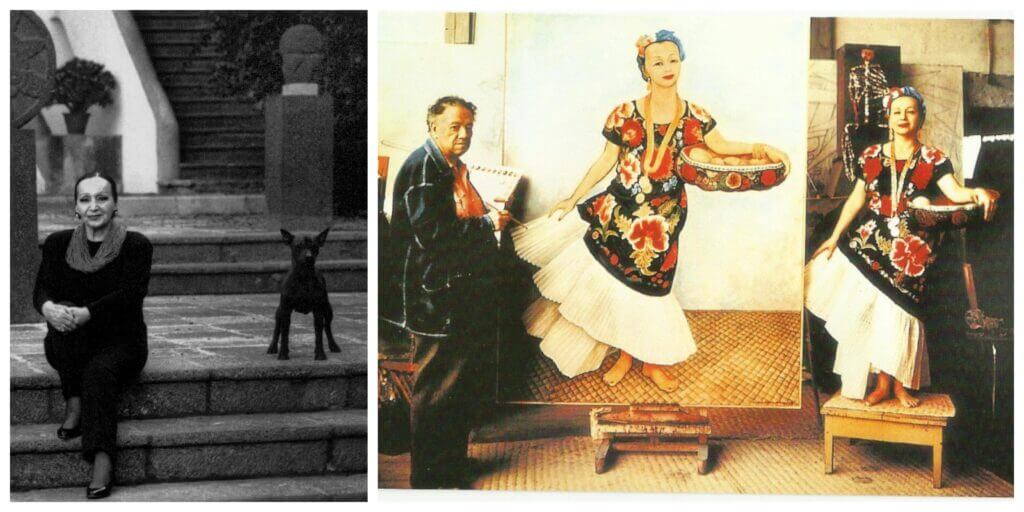
She had a close friendship with Diego, but not necessarily his wife, Frida Kahlo. Rivera painted our Doña as a Tehuana, (see photo above) idealizing her as the beauty of the ultimate Mexican woman…so I’m sure that never went over really well with Frida. We’ll get back to this storyline in a moment.
After Frida died, Diego was a broke ass bitch and so he asked his longtime “friend” to buy all of Frida’s and his collection pieces since he know Doña would take care of the joint collection. Then she was accused of having grossly underpaid for Frida’s shit by other Mexican art collectors. Stories swirled that Doña was jealous and trying to sabotage Kahlo’s legacy. She actually conceded in an interview with The New York Times,
”I was never a friend of Frida Kahlo. Frida Kahlo liked women. I liked men.”
Diego specifically! #baller
After divorcing some dude in the 1940’s, she became one of the first Mexican women to succeed in real estate development and construction. Women did not run companies in México back then, especially construction companies! She started networking with leading industrialists and politicians which fueled rumors that she was banging several Mexican presidents. Doña Lola coyly denied these rumors, but ended up marrying and divorcing three times. #queseráserá
All of these factors left her with some serious ‘dinero’ so she bought an 8 acre property where her current kick ass museum is located is in Xochimilco, in the southern part of Mexico City. It’s a hacienda from the 16th century which was named La Noria (The Well) by someone at some point, but is now the Dolores Olmeda Patiño Museum.
Shop the TexMex Fun Stuff online storefront on Amazon!
She purchased the “farm” in 1962, remodeled it, and moved in circa 1964. In the mid-1980’s she announced that she would convert her home into a museum and then donate her collection for permanent display there. During the renovations, the architects discovered some serious f-ing problems. Eager to get their grubby hands on her collection and the revenue the new museum would generate…the government paid the renovation costs, and in late 1994 the museum opened.
Mr. TexMex Fun Stuff and I went once and the grounds are as amazing as the collection inside… animals freely roam the grounds: peacocks, ducks, Canadian geese, chickens, turkeys and xoloitzcuintles—an endangered species of hairless, ugly as sin pre-Hispanic dogs called Xolos. Here are some shots…

/ Sculpture of Diego Rivera’s bust | Photos: TexMex Fun Stuff
As said in MyHero.com…”Doña Lola was not merely an art collector. She was a lover of art, of culture, of tradition. She was a highly successful businesswoman and industrialist. She was the beautiful muse of paintings. She was a philanthropist who bequeathed her collection to her Mexican peoples.” And a big time chingona!!! (they didn’t say that last part, I did).
Here is an English description of her museum… http://www.revistascisan.unam.mx/Voices/pdfs/3014.pdf
Rosario Ibarra de Piedra
Rosario (1927-present) is alive and kicking at 93-ish years of age. She is a four time candidate for the Nobel Peace Prize and was twice a candidate for the Presidency of México with the Revolutionary Workers Party (PRD). She never actually won either of them, but that never stopped her.
She and her husband and 4 kids lived in Saltillo, Coahuila, just 85 kilometers from Monterrey. Her work as an activist and politician began when on April 18, 1975 her son Jesús Piedra Ibarra was kidnapped for political reasons while he was studying medicine in Monterrey.
The second oldest of her four kids, 21-year-old Jesús was accused of belonging to a communist armed movement known as the Communist League September 23. He was arrested and was “disappeared” by federal police after the murder of a policeman, Guillermo Valdez Villarreal. We can only assume they used the murder of this officer to justify arresting alleged communists. Hard to say though, because Rosario’s husband (Jesus’ dad) had officially been affiliated with the Mexican Communist Party, but not Jesus to all known documentation. He just happened to be in Monterrey on April 18, 1975 …#badtiming

Wkipedia tells us that…When her cries for resolution were unheard she formed the Comité Eureka de Desaparecidos (“The Eureka Committee of the Disappeared”) with about 100 other women in 1977. As a result of her efforts, including several hunger strikes, 148 out of 557 political prisoners on her lists were liberated during the López Portillo administration (1976–1982).
Their mantra was…
“They took them alive, we want them alive!”
#hellyes!
The movement was dedicated to protesting against the illegal arrests and killings of militants in opposition to the government in the chapter of Mexican history known as the Dirty War….Guerra Sucia…six-years of Gustavo Díaz Ordaz and Luis Echeverría Alvarez, following the persecution and illegal detention of militants of armed and social political movements.
45 years later, information on the fate of the poor kid has not been clarified. However, some files indicate that the young man was imprisoned and tortured in various underground prisons. The kidnapping was carried out by members of the Federal Directorate of Security in Monterrey….yikes.
Also, Rosario has fought for indigenous communities and against violence against women and electoral fraud. She joined the struggle to demand clarification of the women killed in Ciudad Juarez and the killings of indigenous people in Chiapas and Guerrero, during the six-year period of Ernesto Zedillo Ponce de León.
She even went on a hunger strike for the release of political prisoners. In late 1978, the government issued an amnesty law, but the whereabouts of the disappeared persons were not clarified. The amnesty resulted in the release of 1,500 prisoners detained with irregularities, the return of 57 exiles and the cancellation of 2,000 arrest warrants.
In 1982 she became the first woman in Mexico to run for the presidency with the Workers Revolutionary Party (PRT), a Trotskyist party (remember Trostsky?). In 1988, she ran for the presidency a second time, again with the PRT. In 1994 she became a federal deputy of the Party of the Democratic Revolution (PRD). Needless to say, didn’t happen, but not for lack of trying.
In the current Prez of Mexico (AMLO)’s closing remarks during during his 2018 presidential campaign, he stated that on election day he would cross out his name on the ballot and, as a tribute, write in Rosario Ibarra de Piedra. …In 2019, AMLO and the Mexican Senate decorated her with the Dominguez Belisario Award (the highest award that Mexico gives to citizens for their contribution to the country) for her political activism and defense of human rights.
Read more about Rosario Ibarra de Piedra
Silvia Torres-Peimbert
Silvia (1940-present) is the first Mexican woman to obtain a Doctorate in Astronomy. She is one of the most internationally recognized Mexican scientists for her research on interstellar matter.
When she was in high school, a teacher encouraged her to take science. So at 18 she began to study Physics at the Faculty of Sciences of the National Autonomous University of Mexico (UNAM).
The Astrophysics course that was taught at UNAM was attended by just four students: two men and two women. She was one of them. Silvia was already captivated by astronomy and had decided to get a doctorate. She soon found out that all the prestigious universities were in the United States AND that they only admitted men! #CHINGA!
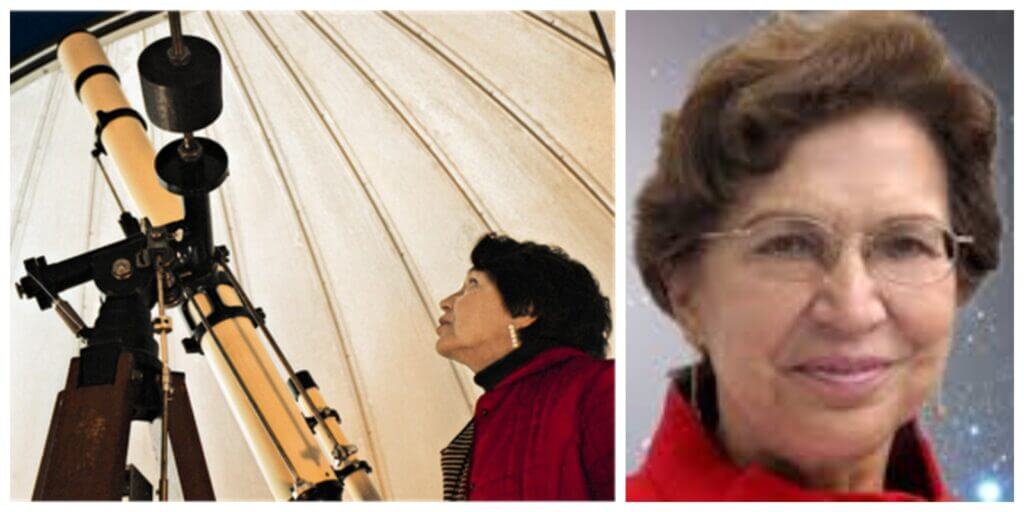
Silvia tried to enroll at Caltech because she had a chance of being accepted there because her husband, Manuel Peimbert, also wanted to study astronomy and she could attend as his wife. Pfft.
However, instead of choosing Caltech, Señora Silvia scored a scholarship to University of California, Berkeley, where she could study for a doctorate in astronomy. This was at a time when women were not expected to have a career, so caring for their two children while continuing her career was a bit of a challenge. #GirlGoals
Silvia Torres was a pioneer in the use of satellites for her important observations. In early 2011, she won the L’Oréal-Unesco Prize awarded by the United Nations Organization in the category of “Women of Science”, due to her research on the chemical composition of planetary nebulae (?), which is considered essential to astronomer’s understanding of the beginning of the cosmos.
Shop the TexMex Fun Stuff online storefront on Amazon!
In 2012, she was chosen by the General Assembly of the “International Astronomical Union” to be President of the organization from 2015 to 2018- she is the first Mexican to be honored with this position. Basically the IAU comes up with the names of planets and other celestial objects, as well as standards in astronomy. #nottooshabby
She is also the past editor of the Journal of Astronomy and Astrophysics and the past President of the International Astrological Union being only the second women to preside over this organization based in Paris, France that brings together more than 11,000 specialists from 90 countries. Plus she raised two kids. How on earth?
Read more about Silvia Torres-Peimbert
Dolores del Río
Dolores El Río (1904-1983) was an actress, singer and dancer who’s career spanned more than 50 years. She is known as the first Latin American actress to cross over into Hollywood and who paved the way for María Félix and Katy Jurado. Some films include The Fugitive with Henry Fonda and Flaming Star with Elvis.
When Dolores was 15 years old she asked her mother if she could take dance lessons, but she was stricken with insecurity because she felt like an “ugly duckling”. Her mother commissioned famous artist Alfredo Ramos Martínez to paint a portrait of her daughter to show her how beautiful she really was.
The portrait helped Dolores overcome her insecurities and she is now considered a mythical figure of American and Mexican cinema, and a quintessential representation of the female face of Mexico in the world. She was considered a female Latin Lover…here’s why…
“The most beautiful, the most gorgeous of the west, east, north and south. I’m in love with her as 40 million Mexicans and 120 million Americans who can’t be wrong”
Diego Rivera

In 1930, Dolores met Cedric Gibbons , artistic director of Metro-Goldwyn-Mayer at a party at Hearst Castle. The couple began a brief romance that culminated in marriage months later. Dolores’s marriage to one of the most important Hollywood Hombres helped her career for a while (as the infamous “they” say).
In 1940, with her career declining, she met actor and director Orson Welles . Welles had been hot for her for several years and feeling a mutual attraction, the couple began a torrid affair, which lead to the divorce of old Cedric. For Welles, Dolores abandoned her acting career to be by his side during the filming of his masterpiece: Citizen Kane.
Later Welles went to South America, as a Goodwill Ambassador to counter the spread of communism…Buuuuut, Welles went really wild at Carnival in Rio de Janeiro, like a crazy whore. Dolores then decided to dump his ass through a telegram that Orson never bothered to answer. #brutal
Then came the death of her father in México. Faced with this situation, the actress decided to cancel Hollywood altogether:
Divorced again, without the figure of my father, a movie where I hardly appeared, and another where they showed me the way of art. I wanted to follow the path of art. Stop being a star to become an actress, and that could only be achieved in Mexico. I wanted to return to Mexico, a country that was mine and that I did not know. I felt the need to return to my country …
#vivamexico
She was never nominated for an Academy Award, but on the day of her death, she received in the mail an invitation to attend the Oscars. #alittletoolittlealittletoolate Buuuuuuuut, she banged Orson Welles for 3 years…so there’s that.
Read more about Dolores del Río
Elena Poniatowska
Again with these crazy names… Hélène Elizabeth Louise Amélie Paula Dolores Poniatowska (1932-present) or Elena as we will call her, was born in Paris after her mother fled México during the Revolution. Luckily, she was born into French and Polish (distant) royalty! Sadly, the whole family had to escape back to México when Elena was ten because of the start of WWII in Europe. She never went to college, BUT is trilingual (English, French, Spanish) and a bad ass writer! Shit ain’t gonna write itself! #chinga!
She got married in 1968 and then on On October 2, 1968 she was in México City at home with her 4 month old and outside there were protests. 10,000 university and high school students were marching and protesting against México investing $150 million to bring the Olympics to the city.
There was a heavy police presence that night and helicopters circling above the crowd when a large white sheet was thrown from one of the helicopters towards a section of the crowd. The white sheet was a signal to the snipers on the rooftop to start firing where the sheet lands. That was the night of the Tlatelolco Massacre when federal snipers killed 300-400 people/presumably students in the crowd.
Elena raced to the scene and with blood on the streets she started interviewing people. Her book titled, La Noche de Tlatelolco (The Night of Tlateloco )…translated to English readers as “Massacre in México” was the only book published about this night for 20 years…contradicting the government’s account of the events and the number dead.
She did it again in 1985 after the Mexico City earthquake with Nada, Nadie, Las Voces del Temblor (Nothing, No one, Voices from the Earthquake). This book was a compilation of eyewitness accounts not only to the destruction of the earthquake, but also to the incompetence and corruption of the government afterwards. #Cabronamove
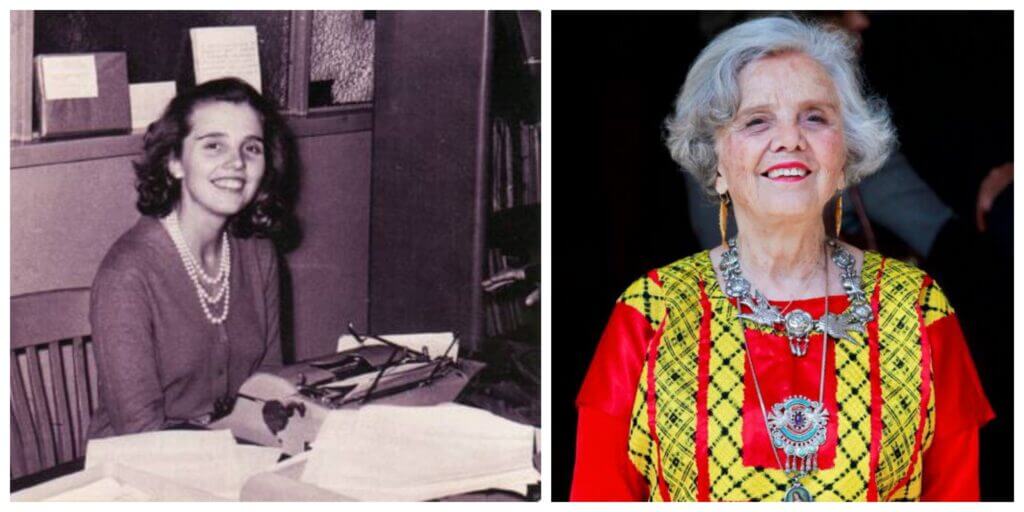
These books cemented her as the voice for the disenfranchised people of México uncovering social and human rights atrocities against women and the poor especially. Despite the lack of opportunity for women from the 1950s to the 1970s, Elena wrote essays and articles in newspapers and magazines and books both fiction and nonfiction:
Two of her short stories were about Diego Rivera (again with that guy). The first one was Dos Veces Unica (Twice Unique) about his relationship with his first wife Lupe Marin and then Querido Diego, Te Abraza Quiela (Dearest Diego, Quiela hugs you) about his second wife, Russian painter Angelina Beloff. Elena’s goal was to “de-iconize” him since he was so douchey to Lupe, Angelina (nicknamed Quiela)…and all of his wives. #takethatdiego
And in one of her most bad ass moves, she turned down the title of Princess of Poland that she inherited through her father’s royal family! Very Meghan Markle of her.
She is considered to be “Mexico’s grande dame of letters” and is still an active writer living in Mexico City. She was the first woman to receive the National Journalism Award and is one of the founders of La Jornada newspaper, Fem, a feminist magazine, Siglo XXI a publishing house and the Cineteca Nacional, the national film institute. For over thirty years, she has taught a weekly writing workshop, cuz girl gets shit done. SO THERE!
Read more about Elena Poniatowska
Norma Romero Vázquez, Her Cuñada and Las Patronas
Norma Romero Vázquez and her family live in the town of La Patrona, Veracruz. I didn’t know where the hell that was either, but evidently all trains from Central and South American countries eventually pass through it and specifically they pass 1/2 block away from Norma’s house.
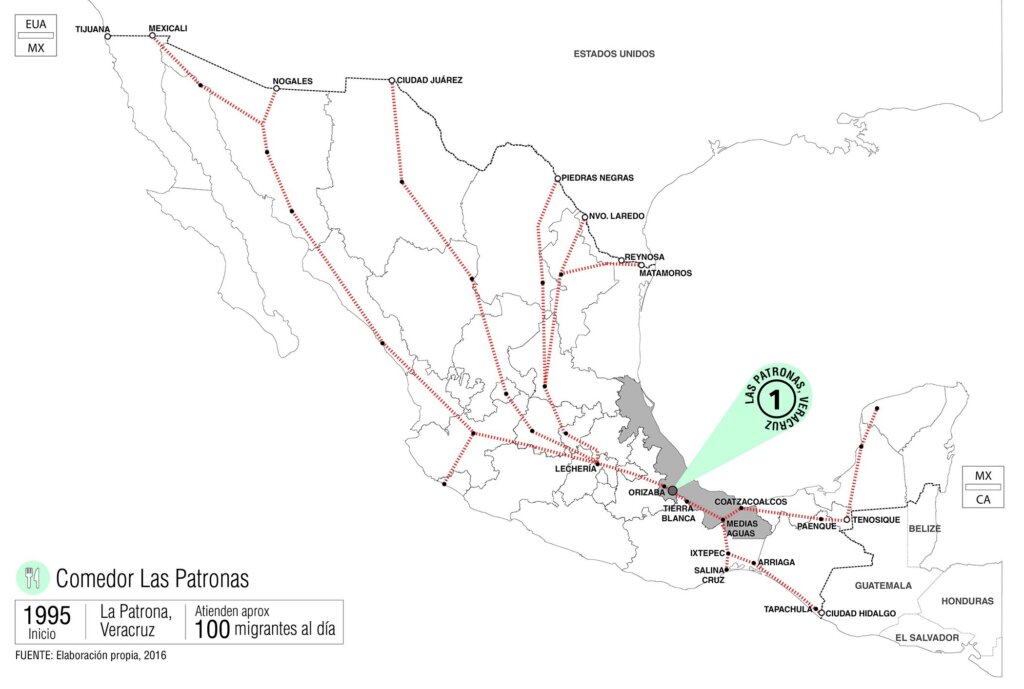
On October 8, 1994 Norma and her sister-in-law were returning from the store with food for breakfast when the train passed by slowly. The train was packed full of people migrating from the southern border of México to the US in search of the “American Dream”. These people were screaming and begging for food so Norma and her sis-in-law threw what they had just purchased to the strangers on the train. #instinctiveactofkindness That was just the beginning…
Since then, Norma, mama, sis-in-law and a group of volunteer gals prepare between 15 and 20 kilos of beans and rice and deliver about 300 daily lunches. They are now known as “Las Patronas” or the Patron Saints of Migrants. This train route has many names, Las Patronas call it “Death Train”, but most call it La Bestia (“The Beast”). It is basically a network of cargo trains that carry fuel, supplies and about 400,000 to 500,000 migrants annually up north.
When La Bestia passes, Las Patronas approach the tracks and have approximately 15 minutes to throw the bags of food they have prepared, as well as bottles of water, so that the migrants can catch the food from the moving train. After so many years, they now have sponsors and numerous donations, among them are large companies such as MASECA MEXICO and CHEDRAUI….it ain’t easy for a pinche gang of chingonas to get this type of corporate assistance!
In 2013, Norma was awarded México’s National Human Rights Award and the Sergio Méndez Arceo National Human Rights Prize. In August 2015, Las Patronas were nominated for the Princess of Asturias Award in Spain which recognizes outstanding achievement in cultural, social and human work. They’ve also been the subject of numerous documentaries, including De nadie (2005) and Llévate mis amores (2014).

Lydia Cacho
Lydia Cacho (1963-Alive and Hot) is described by Amnesty International as “perhaps Mexico’s most famous investigative journalist and women’s rights advocate” and her reporting focuses on violence against women and sexual abuse against women and children. She is an expert in research into gender-based violence, health, children and organized crime. She is also a renowned specialist in journalistic coverage in risky situations and survivor of police torture due to her professional work.
She’s been threatened, persecuted, kidnapped and tortured for uncovering and calling out child sex trafficking and femicide (or feminicide is a sex-based hate crime term, broadly defined as “the intentional killing of females (women or girls) because they are females). In fact her efforts resulted in Mexico’s first conviction for child pornography and sex trafficking.
Her book, The Demons of Eden: The Power that Protects Child Pornography specifically called out rich businessmen and Mexican politicians who coordinate rings to kidnap, traffic, generate child pornography and sexually abuse children. #boom
She has written 12 books in her 25+ years as a journalist, and is the most awarded Mexican journalist with 55 international medals. Newsweek and The Daily Beast consider her one of 100 women that move the world.

Main Photo Cred: Guillermo González
She is a Goodwill Ambassador for the United Nations Agency on Drugs and Crime. For 25 years she has been an editor and contributor on radio and television as well as in various national and international newspapers and magazines. She is co-founder of the Network of Journalists of Mexico, Central America and the Caribbean. She founded the women’s care center and her victims of violence CIAM Cancun A.C., certified by the National Training Center for Domestic and Sexual Violence.
Some of my favorite quotes from this Latina Lovely are:
Prostitution is a social instrument to give pleasure to men and to subdue women.
The cost I have paid to be a good reporter and human rights defender is enormous.
Being a feminist is to accompany girls and young people, show them paths of freedom, teach them to discuss and argue their own ideas; share the secrets of how you overcome obstacles and then withdraw. Yes, let them shine with their own light, show their leadership style, see them break their teachers’ schemes. That is the true liberating feminism
#wellsaid
Read more about Lydia Cacho here…
Martha DeBayle
I would be remiss if I did not sneak in Martha Debayle.
My Mexican bestie, Julissa Garcia, would fucking kill me for not mentioning MB. After all, it is her podcast that led me to the Wellness Clinic in Mexico City that diagnosed my hypothyroidism and gluten intolerance!
Also, Martha Debayle is hot and a powerhouse broad known to women and men all over Mexico. She talks about girly things, sexy things, motherhood things, womanhood things, you get it. Everyone who listens to her loves her.

Buuuuuuuuut, as Julissa says, Martha was born in Nicaragua and raised in Long Island, NY before being brought to Mexico City at the age of 12. She has a great voice and is bilingual which has led to her amazing radio, podcast and TV presenting career. Buuuuuuuut, that does not make her chingona…it makes her talented, smart and hot. Please take note that I mentioned her. My thyroid and I thank you.
THE END
So there you have it. Are these chingonas bad ass or what?! Thank you for reading and agreeing.
Related Posts
Amazing México Instagram Feeds You Should Follow
Part 1:
Related Posts
Part 1: Badass Chingonas of México NOT Named Frida Kahlo
Ernesto de la Cruz…Is Coco’s Infamous Singing Superstar for Real?
What is the Deal With These Badass Mariachis?
La Lotería Ain’t Your Grandma’s Mexican Bingo.
Who Knew “God’s Eye” Was So Sexy? The Huichols Did, That’s Who!
Ernesto de la Cruz…Is Coco’s Infamous Singing Superstar for Real?
What is the Deal With These Badass Mariachis?
La Lotería Ain’t Your Grandma’s Mexican Bingo.
Who Knew “God’s Eye” Was So Sexy? The Huichols Did, That’s Who!
Shop the TexMex Fun Stuff online storefront on Amazon!





